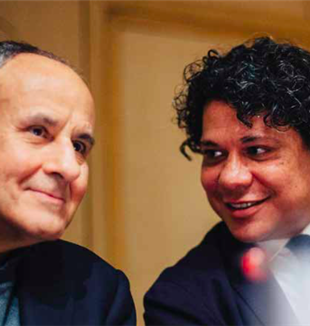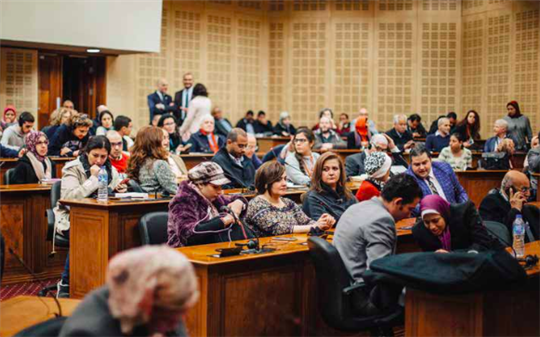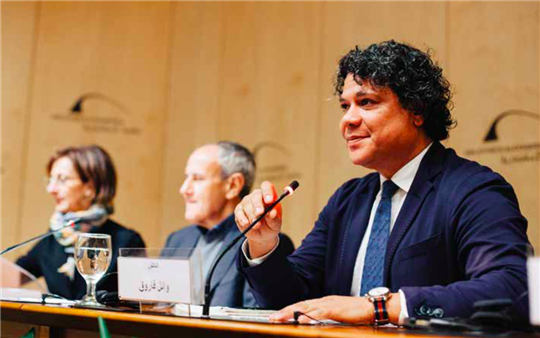
The Seeds of a Presence
The Arabic translation of Julián Carrón’s Disarming Beauty was presented on December 26 at Bibliotheca Alexandrina in Egypt. But what made it possible for the proposal of the book to reach the heart of the Islamic world?I arrived in Alexandria with the book in hand, along with all that had been written about it in the newspapers. I was also carrying the hope that the ancient library of that historic city would grant our request to present the book there, together with a group of Egyptians who had embarked on a beautiful spiritual journey. The Bibliotheca Alexandrina was designed to look like the sun rising over the Mediterranean, and it truly is that: its value lies not so much in its glorious history, swallowed up centuries ago by the flames of ignorance and fanaticism, as from its capacity to instill new life into an historical heritage. With feet firmly rooted in the past and eyes looking to the future, it has become the beating heart of Egyptian culture, a space of freedom where one can pose questions and reason can seek courageous answers.
The security guard took me to the director’s office, which was filled with visitors from Egypt and abroad. I sat down, waiting for my turn to enter. I was at the bottom of the list, seeing as I was neither a government official nor an ambassador, but merely a young university professor. After five hours, the secretary came to tell me that I would not be able to meet the director that day, and asked if I could come back the next week. I returned the next week, and the next, and every week for three consecutive months before I managed to meet with him. In the end, he agreed to let us use a room, not because he believed in the importance of the book, but thanks to the intercession of the library’s staff, for whom I had acted as a courier between Cairo and Alexandria for three months…
That was 2006, and the book was The Religious Sense by Luigi Giussani. Following the presentation of that book, the attitude of the library’s management changed radically. The book anticipated a discussion about the renewal of religious discourse. At the time, interreligious dialogue had lost much of its credibility–the Egyptians called it “kissing beards,” the beard of the imam and that of the priest, because it was purely a formal act in which the only encounter took place between beards, not between people.
Those who attended the presentation of The Religious Sense discovered that the coexistence of Islam and Christianity in Egypt was a question of identity, which had to do with the self, with reason and reality, as well as the connection between tradition and the present moment. That was what most attracted readers. They were fascinated by the expository creativity Giussani employed in pinpointing two components of identity, each indispensable for the other; in fact, each nonexistent without the other. The first was the “material of identity,” meaning those traditions rooted in history and consolidated in the consciousness of contemporary man, which are daily put into practice in the form of mental categories and ways of being. The second was the “form of identity,” meaning the awareness generated in each person by the experience he has of reality, which is always unique and new–in other words, the person himself, in whom and through whom faith becomes flesh and bone.
A few years later, Egypt went through a revolution that brought down many stereotypes. In Tahrir Square, the bodies of many Muslims became churches, a human chain carving out a space where Christians could celebrate the Mass. The bodies of Christians, in turn, became mosques where Muslims could pray. Tahrir Square was not a place of dialogue, but rather of witnesses to the faith of the people gathered there, who risked everything in the name of freedom. We were no longer speaking of dialogue, but of shared witness and prayer. Not long after, for the first time in history, the Egyptian president attended Christmas Mass, and Pope Francis came to visit Cairo, where he presided over the largest Mass Egypt has ever seen. In the stadium where that Mass was held, there were Catholics, Orthodox, Protestants, and Muslims praying together. By meeting with the Grand Imam of al-Azhar, Pope Francis relived the meeting between St. Francis and Sultan al-Kamil.
After that visit, Mostafa El Feki, the director of Bibliotheca Alexandrina, launched an initiative in which every Egyptian school would study Pope Francis’s speech, and he came to the Rimini Meeting, saying that all Egyptians, Muslims, and Christians are sons and daughters of Christ. That atmosphere, that social reality, and that history invigorated El Feki, inspiring him to translate Disarming Beauty, Julián Carrón’s book, into Arabic and give away copies at the library, that it might reach all Arab readers. For the job, he chose the most talented and accomplished translator available, and the library insisted on assuming responsibility for the costs of translation, printing, and publication.
And so, there I was yet again on stage at the Bibliotheca Alexandrina to present another book to Arabic readers. This time, however, every door and every heart had been thrown wide open. On the morning of the event, December 26, over 200 authors and intellectuals were gathered at the library to talk about religious discourse. At the end of the discussion, El Feki said that the true conclusion to our meetings would be that evening with the presentation on Carrón’s book, which he recommended that they all read. A number of intellectuals, some young and some well-established, decided to stay, delaying their return to Cairo to be able to attend the event with Carrón. That evening, the hall was overflowing with people. Still ringing in their minds and hearts were those two days of discussions on the meaning of faith, its relationship to the public square, its place in society, and its role in education.
The presentation began. The first to speak was Hussein Mahmoud, the translator and dean of the Faculty of Linguistics and Translation at Badr University of Cairo, BUC, a private university with about 10,000 students. He also translated Pope Benedict XVI’s Jesus of Nazareth into Arabic. He recounted, “At first, I said no to translating the book. Then, one evening, out of curiosity, I started flipping through it. I sensed that it responded to many questions that directly affect the Arab-Islamic culture and that it, without preaching too much, touched on many sore points, even offering appropriate remedies. So I rushed to call the library to tell them that I would like to translate it.” Mahmoud went on, summarizing the points that struck him, until he was interrupted by the enthusiastic entrance of El Feki. He had regretfully turned down participation in the event because he had to take the President of the Republic on a tour in Alexandria to inaugurate a few projects.
As soon as the tour was over, however, he rushed back to the library. He came into the room, walked onto the stage, and stated his regrets that the visit with the president caused him to miss out. Then he corrected himself, laughing, “It seems like my desire to meet Carrón could cost me my job!” And the room broke out in laughter with him. El Feki explained why he was so set on translating the book and inviting Carrón to present it: because it restores the thread, which had been broken, of fruitful exchanges across the Mediterranean. The book is just as interesting for “them” as it is for “us.” It is a kind of contemplation of oneself with one’s eyes focused on the other.
At that point, El Feki’s gaze landed on the legal scholar Mufid Shehab, former Minister of Higher Education and leader of the legal team that negotiated the return of the city of Taba to Egypt after the Israeli occupation of Sinai ended. He asked me–since I was the moderator for the evening–if we could pass him the microphone to say some words of welcome to Carrón. Professor Shehab described how happy he was with the presence of the distinguished Italian delegation, which reawakened his nostalgia for the years he spent in Rome studying art. “I did not read the book, but what I have heard about what is written in it has convinced me that one of the causes behind the crisis in religious discourse is how we close in on ourselves. Extremism and terrorism did not exist when college students went to study in Europe and European professors came to teach in our universities. I hope that tradition can be reestablished. Though it may be difficult to send Egyptian students abroad right now, there is no problem for Italian professors who would like to come to Egypt. Despite the fact that I am nearing 80 years old, I am ready to volunteer to work on any project that could broaden the horizons of our Egyptian young people.”
The microphone then passed to Professor Salah Fadl, one of the fathers of Egyptian modernity and the best-known Arabic-language commentator on Dante Alighieri. Fadl was seated in the audience, and they gave him the floor as those on stage sat listening. The professor said that the title of the book and the brief meeting he had with Carrón before the presentation opened his eyes to what might be the answer to the crisis in Islamic religious discourse. “It is a solution that has always been right in front of our eyes, but we have never paid attention. It was necessary for Carrón to cross the Mediterranean to show us that the solution is beauty.” He then began to enumerate all the ways beauty is manifested through religious and cultural practices and is a foundation upon which a new discourse can be built.
Focus moved back from the audience to the stage, from the beauty of tradition and language to the beauty of the law. Marta Cartabia, the vice-president of the Italian Constitutional Court, took us to those places in pluralistic societies that do not require anyone to give up beauty or freedom for the sake of the public interest, because the laws that regulate that public interest must be beautiful in order to be just. Or, to put it another way, they are just because they are beautiful. The key words in the book are encounter and freedom, and both are impossible without beauty. Cartabia charmed her listeners and made you think it perhaps downright necessary that a person of the law also be a poet, because, within ordinary things, he or she must discern aspects that other people cannot.
Two and a half hours into the presentation, Carrón still had not spoken. I imagine he had never participated in such a chaotic event, with such blurred boundaries between the stage and the audience. It seemed more like a public demonstration than a conference, but a demonstration of love. Perhaps he had this same perception, as he concluded by saying, “It seems to me that nothing could better express what I attempted to say in the book than what we have seen this evening. We need to create spaces in which, by listening and being open to the contributions of others, we can walk away different compared to when we entered. And do so despite all of our differences, which often make us think that it would be impossible.”
Our concept of dialogue underwent a deep transformation. Carrón’s book and the story of how it came to be translated in Arabic were important steps toward that change. Dialogue is no longer a form of negotiation to reach a compromise. It is no longer a search for points of contact or an overlooking of differences. It is no longer a formal dialogue, but rather presence. In every form it takes, a presence generates hope. One does not have to be powerful nor an intellectual, but simply, as we are able, the best we can be. It is a presence that awakens the desire for good and for beauty, a witness that opens the way for encounter, and a gaze that helps a person discover himself… These are new words for a new phase, a new experience of interacting with reality, one in which misunderstandings dissipate and stereotypes are dismantled, in which we free ourselves and others from preconceptions. It is a continual celebration of life.
It was an important gesture. After the presentation in Alexandria, it is likely others will follow, but in the meantime, we are getting ready to celebrate Pope Francis’s visit to the United Arab Emirates. A presence scatters seeds without knowing in which hearts they will flower, but with the certainty that they will bear fruit.#DisarmingBeauty